What are phytosterols?
What are phytosterols like that common member beta-sitosterol, which is richly found in avocados? It's important in preventing prostatitis.
These are supremely important plant fats; they are compounds with a structure similar
to that of cholesterol. We call them functional foods; they promote health and help prevent disease.
Phytosterols control the movement of fluids through the cell-membranes and are found in small quantities in every vegetable we eat.
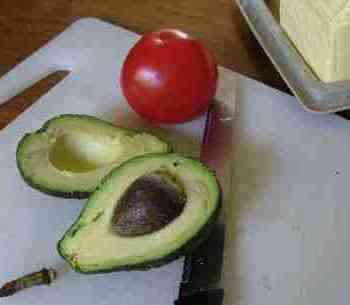
This page was last updated by Dr Barrie Lewis on 7th March, 2021.
Don't be put off by the formulation below. This is not a lesson in
organic chemistry but it may be interesting to some. Notice that cholesterol and beta sitosterol have very similar structures.
I'm a chemistry major;
hence there are odd references to molecular formulations throughout this chiropractic site. The finer structure is important but, I think you will agree, I do try to keep it simple.
Their similarity to cholesterol means that these compounds compete with the intestinal absorption of ordinary animal fats.
Eating larger quantities of plants increases the fecal excretion of cholesterol that we have consumed in, say, meat and dairy products.
What's particularly interesting is that food scientists have repeatedly confirmed that phytosterols reduce the unfriendly low density lipoprotein cholesterol whilst not affect the healthy HDL form; blood levels of the latter should be as high as possible.
The high density version helps keep blood vessel walls free of atherosclerotic plaque. Everyone with a cholesterol problem should be able to give a short answer to the question, what are phytosterols?
Don't take them in pill form; they are so easy to incorporate in your diet. What could be simpler than half an avocado per day?
Fill your avocado with hummus and you're home and dry.
Cholesterol lowering plant fats
Cholesterol lowering plant fats and not statins are the solution; we avoid the question what are phytosterols at our peril. They are simply a vital part of what are known as functional foods; preventing disease and promoting health.
Get off statins safely will help you avoid aching legs and impotence.
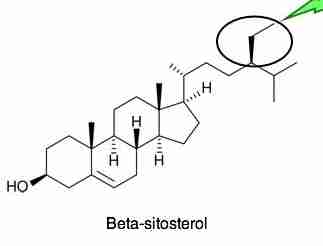
Ordinary animal cholesterol + an extra ethyl group which is ringed.
The American national cholesterol education program recommends phytosterol-enriched foods as part of their prevention of cardiovascular disease program.
This is where naturopathic and medical doctors find themselves poles apart. The former say we should be eating more foods that are rich in phytosterols. Medicine says we should enrich food artificially with phytosterols and take drugs to lower cholesterol; at a great profit to the drug companies.
If you know what phytosterols are, you can save yourself a mint simply by including them regularly in your diet. Are you taking statins? Rather answer the question, what are phytosterols and make a few small alterations to your diet; then after a few months go and be tested again.
There are many studies proving conclusively that the phytosterol compounds will reduce serum low density and total cholesterol and, what's more, in a short time.
A study at McGill University found that after only 10 days, with no change of diet, the addition of beta-sitosterol had a significant effect on low density cholesterol in the blood.
They concluded that these findings suggest that a significant lowering of LDLs and total cholesterol in the blood plasma can be achieved by a modest dietary intake of the phytosterols in a food such as soybeans, the main ingredient in tofu.
Personally, I would rather enjoy the phytosterols in avocado than soybeans which are not my favourite; they are indigestible unless fermented the Chinese way.
In any case avocados have even more phytosterols than soybeans; chickpeas, almonds and extra virgin olive oil are also particularly rich according to webMD. They recommend aiming for 2000 mg per day, but the average American diet has less than a quarter of that. No wonder so many are taking statins.
Functional Foods
Phytosterols are considered to be functional foods, meaning that they have health promoting and disease preventing properties; if we refuse to face the question what are phytosterols then we have to take bucket-loads of pills instead; and suffer an early and probably painful demise.
Researchers at Yale School of Medicine found that 71 of 222 drugs that had been approved by the FDA had to be withdrawn because of major safety issues, years after they were made widely available to patients[6].
The advice of Hippocrates, the father of healthcare, has long been forgotten; let your food be your medicine.
Phytosterols not only improve the health of blood vessels but there are numerous studies confirming their ability to help prevent malignant tumours; particularly of the breast, prostate and colon. More, they have powerful antioxidant properties.
Beta-sitosterol and the prostate gland are often mentioned in the same sentence.
Conditions like prostatitis which is now recognised very frequently to be a non-infective condition, benign hypertrophy which is really just an enlarged gland, and the fatal tumours which are the leading fatal malignancy of men, are all common in older men; the latter tends to metastasizes to the pelvis and spine. They occur regularly and are particularly nasty.
The maximum urinary flow rate at which
men can pee is reduced by prostate enlargement; that means several visits to the toilet every night because you can't empty the bladder.
Squaws wouldn't understand perhaps since they tend to have the exact opposite problem; a leaking bladder is a known side-effect of having taken post menopausal hormone replacement therapy. In brave talk, men have an air lock; it's difficult to initiate urination, and the stream is weak and slow. It takes for ever to have a sweet pee.
Perhaps worse, braves are unable to empty their bladders completely. The post void residual volume of urine is increased, meaning they have to pee more often, and usually have to get up several times at night. Disturbed sleep leads to other problems, not least of which is short term memory loss.
The stagnated urine leads to bladder infections too.
Non-bacterial prostatitis, also called chronic pain pelvic syndrome, doesn't respond to antibiotics. It's a nasty condition causing men to visit the toilet more often, with urgency as they are unable to empty their bladders. In short, men suffer from difficult, painful and frequent urination.
It responds best perhaps to a prostate massage; a non painful but awkward procedure by which your doctor, and some chiropractors, cross-friction the prostate, via the anus, for about two minutes to squeeze out the excess fluid. For my money, that's what I would do, rather than have an operation to excise or ream it which often leads to impotence.
You're looking at a two minute embarrassment once a month as compared to the risk of permanent impotence? For me it's a no-brainer.
Better still, and preferably before the symptoms begin, start today making sure you are eating adequate quantities of phytosterols.
However in the event that you have already started with chronic prostate problems, there is very interesting research that beta-sitosterol has a very significant effect on urine flow.
A typical avocado weighing about 170 grams
would contain roughly 130 mg of beta-sitosterol according to Duester, writing in the journal of the American dietetic association.
In a powerful randomised, double blind, placebo-controlled project, the gold standard of research, men gained dramatic relief within six weeks from taking 130 mg of beta sitosterol daily. Not only did their symptoms decrease, but the residual urine in the bladder as determined by ultrasound scans and the flow rate improved dramatically.
Eating natural phytosterols as in avocados has no side effects; however there are concerns about taking it in pill form as there is also inhibition of the absorption of the fat soluble phytonutrients such as vitamin E.
Beta-sitosterol is a completely natural substance that you should be enjoying in your food every day; God's gift to the prostate.
A person enjoying plenty of fruits and salads might eat nearly 1000 mg of phytosterols, of which a large portion is beta-sitosterol per day, but the meat and potatoes man would have almost none.
Beta sitosterol
Beta sitosterol research confirms that it is an effective treatment for benign prostatic hypertrophy; better still, facing the question what are phytosterols squarely means we can usually prevent these nasty diseases.
Butternut squash soup recipes wouldn't have much phytosterols, but if you keep the seeds, spread them on an oven tray and toast them, you can enjoy these important nutrients.
Results
There was significant improvements when comparing the treatment of benign prostatic hypertrophy with beta-sitosterol as compared to a placebo; the quality of life especially was much improved. There were also significant improvements in the maximum urinary flow rate, and a decrease in the post voidal residue in those treated with beta sitosterol.
The conclusions of the researchers is as follows; these results show that phytosterols and in particular beta-sitosterol are effective in the treatment of a benign enlarged prostate.
Phytosterols, varicose ulcers and haemorrhoids
A proprietary gel called MELLADERM, which contains beta-sitosterol and honey has dramatic effects on varicose ulcers.
Varicose veins in legs need to be evaluated and treated before they form painful ulcers.
What are phytosterols?
What are phytosterols but cholesterol-lowering plant compounds in sesame, butternut and sunflower seeds, for example.
The Journal of Agricultural and Food Chemistry reports on the amounts of the phytosterols present in nuts and seeds.
Sesame seeds have the highest total phytosterol content (~ 400 mg per 100 grams), sunflower seeds (280 mg/100 g), pumpkin seeds (265 mg/100 g).
The main problem with sesame seeds is that you have to "fletcherise" to get the nutritional value from them. Chew each mouthful 32 times! The best alternative is to grind them in a cheap coffee grinder and make them into Tahini, a sort of "nut butter", only nicer, and not spoiled with the addition of sugar, chemicals and hydrogenated oils.
Tahini is widely used in the Middle East in various foods such as hummus. Rich in phytosterols.
What is sesame tahini?
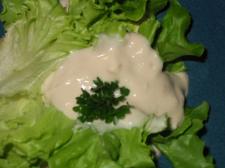
Seed oils
Various seed oils from sunflower, rapeseed (Canola) and corn, for example, are also rich in phytosterols, and are in fact one of the best sources.
Beta sitosterol is one of the most abundant of these cholesterol-lowering plant phytosterols.
This phytosterol complex is particularly heat labile; they are easily destroyed by high temperatures.
Extraction of these seed oils involves multiple chemical extractions, heating to very high temperatures and refining; degumming and bleaching too which results in a loss of 10 - 70% (Kochhar, 1983; Phillips et al., 2002) of the phytosterol,
Or just enjoy the freshly-ground seeds. A simple coffee grinder in every kitchen for grinding them is a must.
Furthermore, Piironenen et al found that the refining regimen causes significant oxidation and other intermolecular transformations of phytosterols.
Try and find cold-pressed fats. Better still, grind your sunflower seeds and enjoy olive oil.
Everyone with a cholesterol problem needs to be able to answer the question, what are phytosterols?
Phytosterols as a food additive
Farquhar et al. found that artificially adding a beta-sitosterol extract made food products
unpalatable and unmarketable. Its chemical properties make phytosterols "difficult
and inefficient" as a food additive[1].
CONCLUSION
It really shouldn't be necessary for us to take extra phytosterols. If we eat them every day, we are far less likely to get raised cholesterol, prostate hyperplasia, haemorrhoids, varicose ulcers and metastatic disease.
They are found in all vegetables, salads, seeds and cold pressed oils.
Fruit oils, from the olive and avocado too are rich in beta-sitosterol - up to 2%.
Can you now answer the question, what are phytosterols?
IMPORTANT CONSIDERATIONS
Here's the deal. Why wait until you get malignant disease or prostate engorgement?
PROSTATE GLAND HEALTH is a vital subject for every male, for every woman too if loss of her male's libido is important to her!
Why wait for varicose veins ulcers? Now is time to increase your cholesterol lowering plant phytosterols, and to think about a natural cure. Now is the time, TODAY, to start, for example by looking through our HEALTHY LIVING TIPS page.
Prevention is better than a cure, eh! If you enjoy cooking, even if you don't, then you might dip into these easy soup recipes[2].
They are loaded with the phytosterol sitosterol and its 250 first cousins, all there waiting for you, in the prevention of cancer and other diseases. They are also full of soluble fibre, the good stuff that prevents constipation, surely one of the greatest evils that besets the large bowel.
A friend confided in me: having an operation for piles is like having a roll of barbed-wire stuck up your rear-end. Rather what are phytosterols?
So, now you know how answer the question what are phytosterols.
Make your own healthy choice foods[3].
A phytosterol lunch
Did you know that you can literally make your own authentic hummus recipe[4] in only four minutes?
Well, that's my record; it's very cheap. I make 500ml of hummus twice a week. Chickpeas and sesame seeds ground into a paste called tahini are the chief ingredients of hummus; make this into a phytosterol lunch!
This my lunch today; if you enjoy hummus regularly then butter should hold no fear. Usually we have a lot more greens too; that's the hummus on the left.
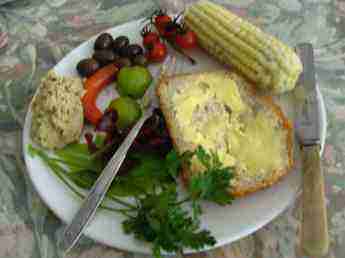
Whole wheat incidentally is listed amongst those foods containing the greatest amount of phytosterol.
Baking your own low GI loaf[5] is a cinch if you have a bread maker.
Note though that through a deceptive loophole, millers are allowed to call their product 'wholemeal' provided they haven't removed more than 51% of the wheatgerm and bran; that's where the phytosterol lignans are to be found.
Also it's good to know something of the meaning of gluten[6] if your bread gives you abdominal pain, bloating or diarrhoea.
So, hummus made with chickpeas, olive oil and sesame paste, fresh whole wheat bread and avocado, salads... more than enough phytosterols to earn the butter on your bread.
In any case, scientists have now agreed that butter is back.
Hummus and humus
The key to healthy vegetables and fruit is humus[7], the breakdown product of your garden cuttings and clippings, plus all the vegetable waste like apple-cores, eggs shells and potato peels from your kitchen. It's really not difficult, though turning the compost pile takes a bit of muscle work; beats going to the gym. Hummus of course is something quite different.
If you don't already have a corner of the garden set aside, then perhaps it is time to consider starting a compost pile.
Hummus acts a wonderful phytogen, or flavour-enhancer, to your meal. It makes an perhaps otherwise chewy greens palatable. In spring you may have avocados in abundance, but in the autumn there is a surplus of coloured salads from the organic garden.
Can you count 10 coloured foods, all rich in phytosterols on the platter below?
You
may say, I don't possibly have the time to grow all these vegetables.
True, I am semi-retired, but I also find a slot to treat half a dozen
patients in need of chiropractic help most days, go gliding on
Saturdays and trout fishing this weekend; and I have started my next book in
The Family Affair series. The space created for gardening is made by
turning the television OFF! Not that I do not watch some sport and the
odd film.
That is cheese and pickled jalapenos on our low GI bread on the left; a rich, very filling and non-fattening meal. Only the butter is slightly questionable; I won't eat margarine, but I could have used olive oil instead, it's true.
When you eat as many foods that lower cholesterol as we enjoy, then you certainly don't have to fuss with statins and worry about raised LDL.
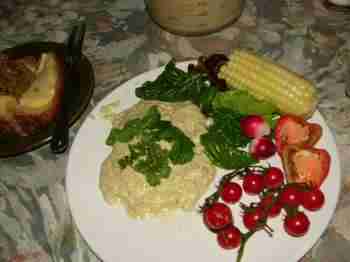
Two kinds of lettuce, young spinach and sweet basil can be seen; then there's fresh corn on the cob, picked only half an hour ago, radishes and pepperdews. Tomatoes without pesticides and hummus with parsley and mint complete the meal.
As one surgeon put it, rather neatly, if we got back to eating the foods that our grandmothers served, rather than what our parents taught us, we wouldn't have those heart problems.
A lunch like this fully answers the question, what are phytosterols?
- Biocatalysis and biomolecular engineering
- Easy soup recipes. Web: https://tinyurl.com/3xa63wjc
- Healthy choice foods. Web: https://tinyurl.com/mv4b68j4
- Authentic hummus recipe. Web: https://tinyurl.com/4yfm4b92
- Low GI bread. Web: https://tinyurl.com/2p8nh5a6
- Meaning of gluten. Web: https://tinyurl.com/bdh3rssy
- Define humus. Web: https://tinyurl.com/yckfpwj2
- Home
- Healthy flour
- What Are Phytosterols
- Home
- Healthy flour
- What Are Phytosterols
Did you find this page useful? Then perhaps forward it to a suffering friend. Better still, Tweet or Face Book it.
